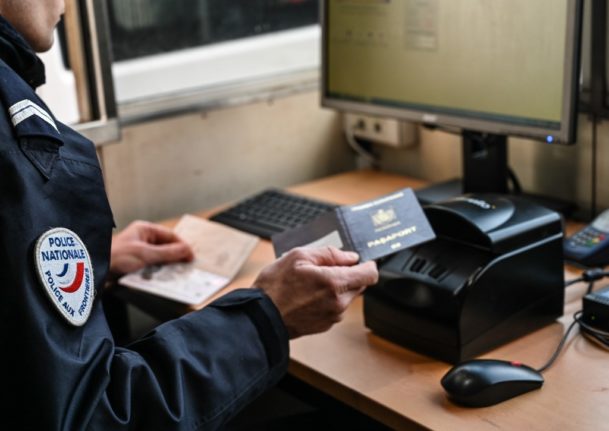British citizens who were resident in France before December 31st 2020 now have an unusual status – no longer EU citizens, but through the provisions of the Withdrawal Agreement afforded many of the same rights as EU or Schengen zone passport-holders.
While this makes perfect sense to British people who live here – after all, it only guarantees (some of) the rights they had when they moved – it is likely to be confusing for others.
Note – this article refers only to Brits who were living in France before December 31st 2020. Anyone who arrives after that needs to follow post-Brexit rules on visas and work permits – full details HERE, while tourists and visitors are subject to different travel rules, full details HERE.
READ ALSO The Brexit Withdrawal Agreement – what is it and does it cover me?
We have already seen some cases of British people wrongly being told they immediately need extra paperwork.
So here are the helpful documents to cut out and keep if you ever need to prove your rights.
Also, a plea – please be patient with French officials who make mistakes. Even those of us who write about it for a living find Brexit pretty confusing and although employees in local government should have been briefed, it is not impossible that some will misunderstand how the rules should apply to Brits.
While we fully appreciate that it’s frustrating and worrying being told your status is not official – and that Brexit itself has been five long years of fear and stress for British people abroad – one thing we can all agree on is that Brexit is not the fault of the employee of the CPAM office/the local gendarme/the lady at the préfecture.
Residency
This is the big one – you need to be sure that you are officially a resident of the country you live in.
What are your rights? If you moved to France before December 31st 2020 and took up legal residency here then you are covered by the Withdrawal Agreement, which gives you the right to stay in France. You do, however, have to apply for a carte de séjour residency card.
You can read the full text of the Withdrawal Agreement (in English) HERE.
There are two key dates here – you have to make your application by September 30th 2021 and must be in possession of the card by January 1st 2022. Until then, there is no legal requirement for you to have a carte de séjour to prove your status as a resident.
How do you prove it? This is the document most likely to be asked for, as it’s highly unusual for non EU residents not have any kind of residency permit or visa.
There are two things you can use here. Once you have made your application for a carte de séjour on the online portal you receive an automated email acknowledging your application. This is an official document and can be used as proof of your residency status until the card arrives, particularly if you are travelling. So we would suggest printing out the email and tucking it into your passport.
READ ALSO EXPLAINED This is how the new carte de séjour online portal works
The other thing you can use is the French government decree, which lays out all of the rules of applying for residency. Published in the Journal Officiel, this document (in French) lays out in Chapter III, article 5 that until the deadline, British people only need a passport to be legally resident. Find the decree HERE.
While the deadline to have made the application remains September 30th 2021, the deadline to actually be in possession of the card has been extended until January 1st 2022. This was a fairly last-minute extension – less than a week before the previous deadline of October 1st 2021 – so it’s not impossible that some people will have missed this. If you need to prove the extension, you can find the Decree HERE.
Resources
When applying for residency, if you are not working, studying or seeking work you will need to prove that you have sufficient means not to be a burden on the French state.
What are your rights – the minimum level of resources for British people in France is more generous than the European standard. You can find full details here, but you need to prove that you have more than the guide figure for RSA (the French in-work benefit) which at present is €564.78 a month. Importantly, this is declared per household, so if you are a couple you only need €564.78 in total per month, not €564.78 each.
READ ALSO How much money do I need to stay in France after Brexit?
You also have the right to a case-by-case decision, so if you fall slightly under the threshold but have savings or own your home outright, that would have to be taken into account.
How do you prove it – the provisions around the minimum income level can be found in the Arrêté that the French government published at the end of November. You can find the document HERE, Article 3 concerns the minimum income level.
The right to an individual decision is mentioned in the Decree and the Withdrawal Agreement.
Working
Although with living in France, the Withdrawal Agreement also guarantees that British people can work here.
What are your rights? If you were resident in France before December 31st, 2020 you are entitled to continue working on the same terms as before – whether you stay in your current employment or apply for new jobs.
Employers will not have to complete any of the extra admin tasks that come with non-EU citizens – such as certifying that the job cannot be done by a European – if they employ a British person who is covered by the Withdrawal Agreement.
If you were a registered job-seeker on January 1st you are also entitled to continue to receive benefits while you look for work.
Until January 1st 2022 you will not have to show a residency card to your employer.
How do you prove it? Again, the principle of being allowed to live and work in the EU is laid out in the Withdrawal Agreement, while the detail is in the French decree.
Chapter IV, article 10 of the decree lays out the right to exercise a professional activity of your choice now and in the future.
Healthcare
What are your rights? This is one of the more straightforward aspects – if you are living France you are entitled to healthcare, although you must register with the French health system.
In practice, most people did this already, so there is no change but if you haven’t here is how to apply.
How do you prove it? When it comes to applying for residency, some people will need to prove that they have healthcare. For this, simply being registered in the French system is sufficient, there is no need to have private cover or the top-up insurance policy known in France as a mutuelle.
READ ALSO Brexit – Do I need a ‘mutuelle’ to get residency in France?
Proving that you’re in the French healthcare system requires an attestation de droits. This is simple to obtain – go to the Ameli website ameli.fr, log into your account and select attestation de droits from the ‘mes démarches‘ section and you will be provided with a download. The certificate you get will be dated from the day you request it and in most cases lasts a year. This can be used for all official purposes.
Driving
What are your rights? – If you are a resident in France you will have to swap your British licence for a French one, but not necessarily immediately.
After a years-long impasse on this issue a deal was finally agreed between British and French authorities.
If your licence was issued before January 1st, 2021, you can keep driving on your UK licence for now. You only need to swap it for a French one once the licence itself or the photocard expires, whichever comes first.
If your licence was issued after January 1st, 2021 you will need to exchange your licence for a French one within one year of moving to France.
Full details of the deal and how to swap your licence can be found HERE.
How can you prove it? Even before the transition period ended we heard reports of some people being stopped and incorrectly told by gendarmes that their UK licence was no longer valid.
The government-run French Public Services website has been updated with full details of the deal and the new conditions HERE.
The above applies only to British residents in France. Tourists and visitors to France can continue to use their UK licences and do not need an International Drivers’s Permit.
Other useful sources
The French government has a Brexit website in both English and French, with details of the rules for individuals and businesses, although it can take some weeks for information to be updated after new announcements. Find the site at brexit.gouv.fr.
The British government has a section called Living in France on its Brexit page which gives an overview of the rules for British people in France – gov.uk/guidance/living-in-france
The British Embassy in Paris also has an active Facebook page giving details of the latest information – facebook.com/ukinfrance
The above three sites are all government sites, so can be used to show a country’s official position on the rules. The following three have no official status, but do contain useful information to keep you up to date.
Citizens’ rights group France Rights has a lot of information and guides for British people in France – www.francerights.org
Remain in France Together (RIFT) has a similar site with lots of information and bitesize guides, as well as an active Facebook page of the same name – remaininfrance.fr
And don’t forget The Local France! In our Dealing with Brexit section you will find lots of information on residency, healthcare, driving, travel, pensions and pets. We are also happy to answer questions from our members.



 Please whitelist us to continue reading.
Please whitelist us to continue reading.
I have just received my Carte de Sejour.
My UK Passport runs until March 2023, but it was obtained in September 2012
Hence 9 and a half years since the passport started is March this year.
Does having the Carte de Sejour mean I can delay getting my new passport, or do I need to renew this March?